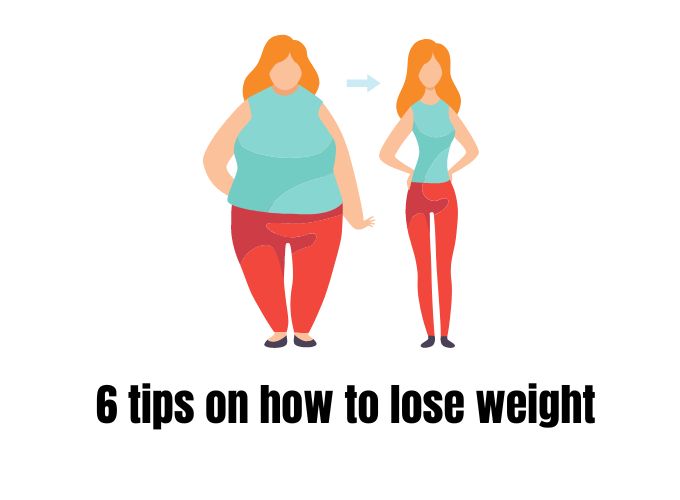Losing weight is a common goal for many people, and it is often associated with improving overall health and well-being. However, with the plethora of weight loss information available, it can be challenging to determine the best approach. In this article, we will explore six practical tips on how to lose weight effectively and discuss why weight loss is important for our health.
the Importance of losing weight
Maintaining a healthy weight is vital for various reasons. Excess weight can increase the risk of developing chronic conditions such as heart disease, diabetes, and certain types of cancer. Losing weight can significantly reduce the likelihood of these health issues and improve overall quality of life.
Tip 1 – Set Realistic Goals
When embarking on a weight loss journey, it is crucial to set realistic goals. Unrealistic expectations can lead to disappointment and frustration, derailing progress. Start by assessing your current weight and determining a healthy target weight. Break the overall goal into smaller, achievable milestones to stay motivated and track progress effectively.
Tip 2 – Follow a Balanced Diet
A balanced diet plays a pivotal role in weight loss. Focus on consuming nutrient-dense foods such as fruits, vegetables, whole grains, lean proteins, and healthy fats. These foods provide essential vitamins, minerals, and fiber while keeping you satiated. Avoid crash diets or extreme calorie restrictions as they are not sustainable in the long run and can have adverse effects on your health.
Tip 3 – Regular Physical Activity
Incorporating regular physical activity into your routine is crucial for weight loss. Engaging in exercises such as brisk walking, jogging, cycling, or swimming can help burn calories and boost metabolism. Aim for at least 150 minutes of moderate-intensity exercise or 75 minutes of vigorous exercise per week. Find activities you enjoy to make the process more enjoyable and sustainable.
Tip 4 – Stay Hydrated
Water is essential for overall health, including weight loss. Drinking an adequate amount of water can help curb hunger, prevent overeating, and enhance metabolism. Replace sugary beverages with water and aim to drink at least eight glasses a day. Additionally, staying hydrated can improve digestion and promote detoxification.
Tip 5 – Get Sufficient Sleep
Sleep plays a significant role in weight management. Lack of sleep can disrupt hormones involved in appetite regulation, leading to increased cravings and overeating. Aim for seven to eight hours of quality sleep each night to support your weight loss efforts. Establish a consistent sleep schedule and create a conducive sleep environment to improve sleep quality.
Tip 6 – Manage Stress Levels
High levels of stress can hinder weight loss progress. When stressed, our body releases cortisol, a hormone that can increase appetite and lead to weight gain, especially around the abdominal area. Engage in stress-reducing activities such as meditation, yoga, deep breathing exercises, or hobbies that you enjoy. Find healthy coping mechanisms to manage stress effectively and support your weight loss journey.
Conclusion
In conclusion, losing weight is not just about improving physical appearance but also about enhancing overall health. By following these six practical tips, including setting realistic goals, adopting a balanced diet, engaging in regular physical activity, staying hydrated, getting sufficient sleep, and managing stress levels, you can achieve your weight loss goals and lead a healthier life.
FAQ 1: How long does it take to lose weight?
The time it takes to lose weight varies from person to person and depends on various factors such as current weight, metabolism, activity level, and adherence to a healthy lifestyle. It is important to focus on sustainable weight loss, aiming for a gradual reduction of 1-2 pounds per week for long-term success.
Is it necessary to count calories?
Counting calories can be a helpful tool for weight loss, especially in the initial stages when you are learning about portion sizes and the calorie content of different foods. However, it is not necessary for everyone. The key is to create a calorie deficit by consuming fewer calories than you burn through a combination of a balanced diet and regular physical activity.
Can I lose weight without exercise?
While exercise is beneficial for weight loss and overall health, it is possible to lose weight without it. The primary focus should be on creating a calorie deficit through diet. However, incorporating exercise into your routine can accelerate weight loss, improve fitness levels, and have numerous other health benefits.
What are some healthy snack options for weight loss?
Healthy snack options for weight loss include fruits, vegetables, nuts, seeds, yogurt, and whole-grain crackers. These snacks are low in calories, provide essential nutrients, and help keep you satisfied between meals. Remember to practice portion control and choose snacks that align with your dietary preferences and goals.
How can I stay motivated during my weight loss journey?
Staying motivated during a weight loss journey can be challenging. Here are a few tips to help you stay on track:
- Set realistic goals and celebrate small achievements along the way.
- Surround yourself with a support system of friends or family members who share similar goals.
- Keep track of your progress through journaling or using a fitness app.
- Mix up your routine with different exercises and meal options to prevent boredom.
- Focus on the positive changes you are experiencing, both physically and mentally.
